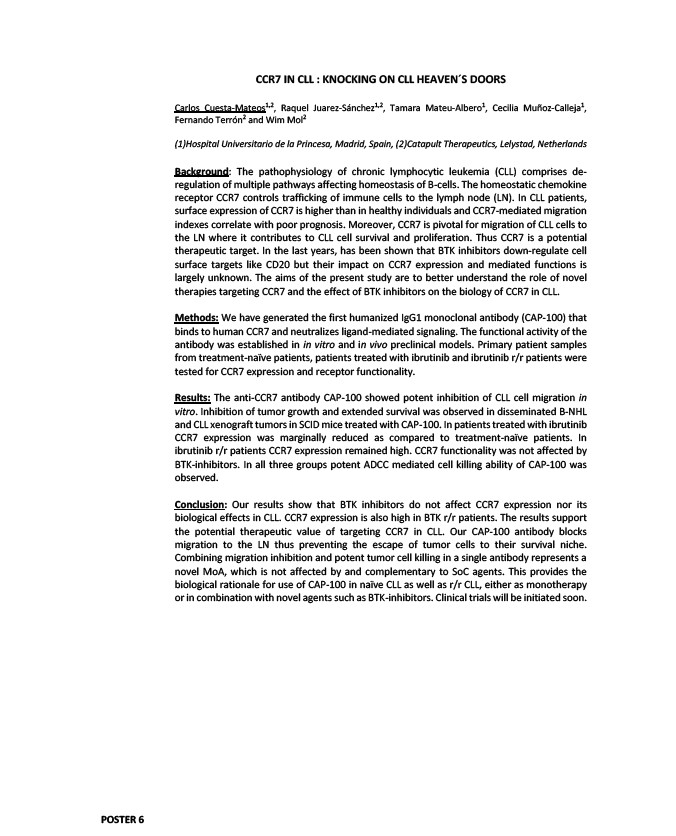
CCR7 IN CLL : KNOCKING ON CLL HEAVEN´S DOORS
Carlos Cuesta-Mateos1,2, Raquel Juarez-Sánchez1,2, Tamara Mateu-Albero1, Cecilia Muñoz-Calleja1,
Fernando Terrón2 and Wim Mol2
(1)Hospital Universitario de la Princesa, Madrid, Spain, (2)Catapult Therapeutics, Lelystad, Netherlands
Background: The pathophysiology of chronic lymphocytic leukemia (CLL) comprises de-regulation
of multiple pathways affecting homeostasis of B-cells. The homeostatic chemokine
receptor CCR7 controls trafficking of immune cells to the lymph node (LN). In CLL patients,
surface expression of CCR7 is higher than in healthy individuals and CCR7-mediated migration
indexes correlate with poor prognosis. Moreover, CCR7 is pivotal for migration of CLL cells to
the LN where it contributes to CLL cell survival and proliferation. Thus CCR7 is a potential
therapeutic target. In the last years, has been shown that BTK inhibitors down-regulate cell
surface targets like CD20 but their impact on CCR7 expression and mediated functions is
largely unknown. The aims of the present study are to better understand the role of novel
therapies targeting CCR7 and the effect of BTK inhibitors on the biology of CCR7 in CLL.
Methods: We have generated the first humanized IgG1 monoclonal antibody (CAP-100) that
binds to human CCR7 and neutralizes ligand-mediated signaling. The functional activity of the
antibody was established in in vitro and in vivo preclinical models. Primary patient samples
from treatment-naïve patients, patients treated with ibrutinib and ibrutinib r/r patients were
tested for CCR7 expression and receptor functionality.
Results: The anti-CCR7 antibody CAP-100 showed potent inhibition of CLL cell migration in
vitro. Inhibition of tumor growth and extended survival was observed in disseminated B-NHL
and CLL xenograft tumors in SCID mice treated with CAP-100. In patients treated with ibrutinib
CCR7 expression was marginally reduced as compared to treatment-naïve patients. In
ibrutinib r/r patients CCR7 expression remained high. CCR7 functionality was not affected by
BTK-inhibitors. In all three groups potent ADCC mediated cell killing ability of CAP-100 was
observed.
Conclusion: Our results show that BTK inhibitors do not affect CCR7 expression nor its
biological effects in CLL. CCR7 expression is also high in BTK r/r patients. The results support
the potential therapeutic value of targeting CCR7 in CLL. Our CAP-100 antibody blocks
migration to the LN thus preventing the escape of tumor cells to their survival niche.
Combining migration inhibition and potent tumor cell killing in a single antibody represents a
novel MoA, which is not affected by and complementary to SoC agents. This provides the
biological rationale for use of CAP-100 in naïve CLL as well as r/r CLL, either as monotherapy
or in combination with novel agents such as BTK-inhibitors. Clinical trials will be initiated soon.
POSTER 6